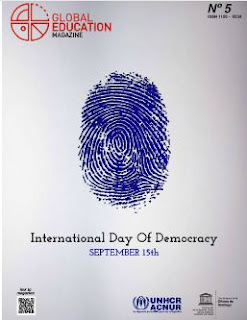Article Human Collaboration the Peoples Revolution of a Global Learning Framework by Richard C. Close
Article Global Education Magazine
Issue 5 Pages 44 - 51
Abstract
“While traditional classrooms
wade through indexed text books chapter by chapter in order to pass Friday’s
test, a torrent of knowledge is streaming past and through the students on
their cell phones. While the teacher at the head of class has a one way channel
of dumping facts into empty buckets, billions of people outside the classroom
walls are exchanging terabits of fluid knowledge in collaborative communities.”
This paper discusses how humans have evolved technology to a point where
Internet learning has bypassed academia, this is the revolution. It then
discusses practical methods for integrating global learning within classroom
academics.
This visionary and disruptive paper proposes an
ugraded set of global education theories and practical methods of how educators
and NGO can leverage the content and collaborations. Digging deeper into
contemporary theories about technical collaboration the article highlights the
role of human context that is managing internet content. The Global Learning
Framework™ illustrates how human experience and local values collaborate with
the global knowledge base. The paper covers how and why global learning via
Internet appliances is bypassing our industrial curriculum models. This paper
is a subset of the paper “Human Collaboration the Peoples Revolution of a
Global Learning Framework available with references at esc.academia.edu http://tinyurl.com/lnap46f
In the same way that dictators
are waking up to flash protests and are shocked at how an entire nation can
overthrow an authoritarian trickle down knowledge structure in days, global collaborative
learning is overthrowing traditional academic classrooms and page turning
eLearning programs. Educators need to take notice that the same revolution of
human-technology is taking place with students that have challenged the
relevance of learning-in-a-vacuum facts that are dysfunctional with our youth’s
reality as a global collaborative.
The entrenchment of
colonial/industrial education is when an authoritarian group imparts their
knowledge down with curriculum textbooks into the working classes/cultures. While
at the same time, democracy in education has the masses fully empowered to
explore, create and share knowledge on equal footing between students, the same
way billions of people typically use the Web today. The disconnectedness
between these two approaches of learning is vast, wide and now becoming antagonistic.
In addition, the argument that the digital divide is because affluence
can afford technology and the poor cannot is now growing weaker, because the barriers
to cell and PC access are fading. It is only about access and soon everyone
will have it. This will happen as the cell phone bypasses the PC as a personal
network appliance.
This article
illustrates the need for new strategies for the expansion of global education
and Telco organizations in order to accelerate the development of villages
throughout the world. We need a massive upgrade to our approach, because it is the
human instinct to learn collaboratively that will drive this growth into a
profitable reality not just by technology itself.




Comments